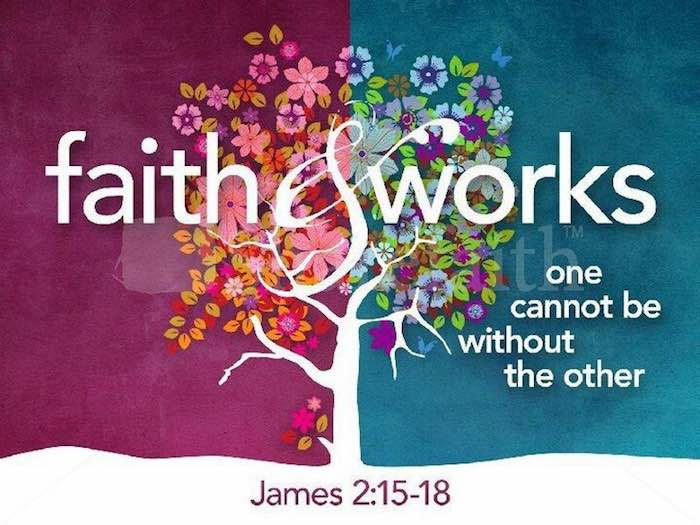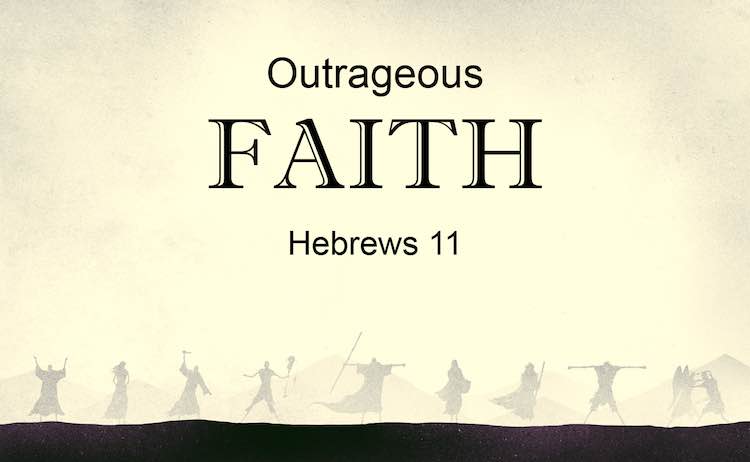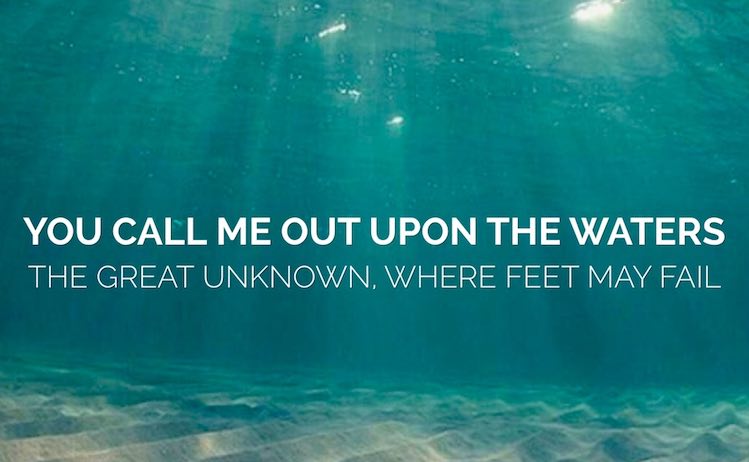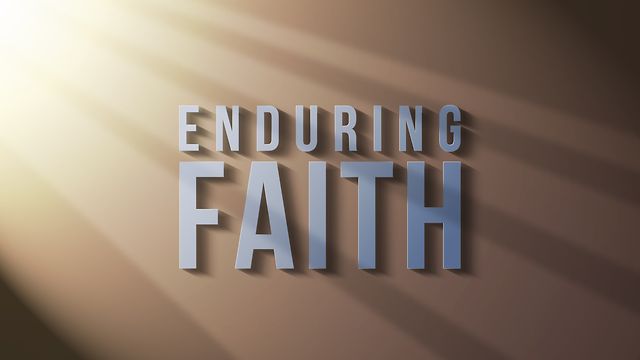Do you have faith in God? I would assume that most of you who are reading this article believe in God and would say that “Yes, I have faith in God.” There is a great variety of expression of faith for those who say that they believe in the God of Abraham, Isaac, and Jacob, however one thing must be consistent in our faith; faith must be expressed in the actions of our daily life.
In the New Testament book of James there is a very challenging set of verses that calls into question the person who attempts to separate faith from the expression of that faith in deed and actions:
What use is it, my brethren, if someone says he has faith but he has no works? Can that faith save him? If a brother or sister is without clothing and in need of daily food, and one of you says to them, “Go in peace, be warmed and be filled,” and yet you do not give them what is necessary for their body, what use is that? Even so faith, if it has no works, is dead, being by itself. – James 1:14-17
Claiming to have faith in God but ignoring the practical commands of God makes one’s faith dead and meaningless.
Faith in God must be exercised through daily life experiences in order to give it meaning and to show the true colors of one’s faith. There is a great illustration of this principle that we read about in the lives of Moses and Aaron in this week’s Torah Portion.

Chukat – חוקת
This week’s Torah Portion is called “חוקת” – “Chukat” and is taken from the phrase “זאת חוקת התורה” – “Zot chukat ha’Torah,” which means “This is the ordinance of the Torah” and the rest of the chapter explains the ordinance of the “red heifer” and how to use its ashes for ritual cleansing. To read more about the ordinance of the red heifer and how it relates to the Messiah, I recommend a previously written commentary on this subject: The Red Heifer
No Water!
Immediately following the chapter of the red heifer, we read about a familiar situation of the children of Israel in the desert; they had no water. The children of Israel complained to Moses and Aaron regarding their lack of water and, in response, Moses and Aaron came before the LORD at the tent of meeting and fell face down before the LORD.
The Scriptures tell us that the glory of the LORD appeared to them and the LORD gave Moses and Aaron a solution to the problem of not having any water:
…and the LORD spoke to Moses, saying, “Take the rod; and you and your brother Aaron assemble the congregation and speak to the rock before their eyes, that it may yield its water. You shall thus bring forth water for them out of the rock and let the congregation and their beasts drink.” – Num. 20:7-8
The LORD had seen the need of the people for water and he told Moses and Aaron to take the rod and speak to the rock before the eyes of the people so that it would bring forth water and satisfy the needs of the people and their animals.
Miracles With Water
The instructions that God gave to Moses and Aaron certainly required much faith by speaking to a rock, however, Moses and Aaron had seen God do amazing miracles with water before. God used Moses to change the Nile River into blood. God also used Moses to split the Red Sea so that the people could pass through and then he commanded the waters to return to their original state, killing Pharaoh and his army. In both of these scenarios, God commanded Moses to take and use his staff to exercise authority over the waters (Ex. 7:15. 14:16).
Moses, The Staff, & The Rock!
There was also a similar situation regarding water and a rock recorded in the beginning of the journeys of the Israelites when they didn’t have any water and God commanded Moses to take his staff:
Then the LORD said to Moses, “Pass before the people and take with you some of the elders of Israel; and take in your hand your staff with which you struck the Nile, and go. Behold, I will stand before you there on the rock at Horeb; and you shall strike the rock, and water will come out of it, that the people may drink.” And Moses did so in the sight of the elders of Israel. – Ex. 17:5-6
At that time God commanded Moses to take his staff and strike the rock in order for water to gush forth. Moses obeyed the LORD and it happened just as the LORD said it would.
Moses knew the power of God over nature to do whatever He wanted to do and whenever He determined for it to be done. Moses was used of God to display His power on earth and Moses was accustomed to taking his staff wherever God would send him. God was again instructing Moses to take his staff with him to bring forth water from a rock in this week’s reading, however instead of striking the rock, God instructed both he and Aaron to speak to the rock.
Moses & The Rock
Despite having seen God faithfully fulfill His words to Moses time and again, Moses decided to take a different course of action than what God had instructed him:
So Moses took the rod from before the LORD, just as He had commanded him; and Moses and Aaron gathered the assembly before the rock. And he said to them, “Listen now, you rebels; shall we bring forth water for you out of this rock?” Then Moses lifted up his hand and struck the rock twice with his rod; and water came forth abundantly, and the congregation and their beasts drank. – Num. 20:9-11
Instead of speaking to the rock as God had commanded Moses and Aaron, Moses struck the rock. Although Moses did not fully obey the words of the LORD, the intended result was still achieved, however, the LORD was not pleased.
God’s Punishment
Despite the water issue being resolved, Moses and Aaron failed to comply with God’s instructions to them and God immediately brought forth judgment on both of them:
But the LORD said to Moses and Aaron, “Because you have not believed Me, to treat Me as holy in the sight of the sons of Israel, therefore you shall not bring this assembly into the land which I have given them.” Those were the waters of Meribah, because the sons of Israel contended with the LORD, and He proved Himself holy among them. – Num. 20:12-13
Because of their disobedience, both Moses and Aaron were barred from entering the Land of Promise.
A Lack of Faith
The words of the LORD to Moses and Aaron were brief and to the point. The LORD literally told them that they did not treat Him as holy before the eyes of the sons of Israel by not believing in Him. The phrase “you have not believed Me” in Hebrew is “לא האמנתם בי” – “lo he’ehmantem bi” which can be translated, “you were not faithful to me” or “you did not believe in me.”
The word for “faith” or “belief” used in this verse is the Hebrew root word “אמן” – “aman,” which literally means “to confirm” or “be faithful” and is the same Hebrew word from which we get the English word “amen.” We also see this same Hebrew word used in the life of Abraham, when he chose to believe in God: “Then he believed in the LORD; and He reckoned it to him as righteousness.” (Gen. 15:6) Faith in God is the cornerstone to building a lasting relationship with Him.

A Life Of Faith
In the letter to the Hebrew believers, there is a complete chapter dedicated to this subject of faith with example after example of men and women who demonstrated their faith in God by their actions. In this chapter, we read the following verse:
And without faith it is impossible to please Him, for he who comes to God must believe that He is and that He is a rewarder of those who seek Him. – Hebrews 11:6
In order to please God with our lives we must have faith. A life of faith will produce actions in keeping with the belief that we profess.
Some people view faith as a religion that one belongs to or possibly as a decision that one makes to hold to a certain set of beliefs, however, it seems to me that the God of the Bible expects much more than this from those who claim to believe in Him. To have faith in the God of Abraham, Isaac, and Jacob is to walk in His ways and to act on all that one knows to be true in accordance to His Word.
Believing faith is not simply a one time decision with a membership card to the “Organization of Believers” for life. Believing faith is a lifestyle of continual action and never ending choices in accordance to the God in whom one believes. We read an example of this in the New Testament in a particular situation involving Yeshua and Simon Peter.
Called Out Upon The Waters
At the end of the day when Yeshua performed a miracle by feeding over 5,000 people, Yeshua sent His disciples to the other side of the Sea of Galilee while He went up the mountain to pray. The disciples ended up getting caught in a storm and were unable to arrive to the other side.
At one point, while the disciples were trying to keep themselves afloat for fear of the waves, they saw someone walking on the water and were afraid that they were seeing a ghost. We then read how the story unfolds:
But immediately Yeshua spoke to them, saying, “Take courage, it is I; do not be afraid.” Peter said to Him, “Lord, if it is You, command me to come to You on the water.” And He said, “Come!” And Peter got out of the boat, and walked on the water and came toward Yeshua. But seeing the wind, he became frightened, and beginning to sink, he cried out, “Lord, save me!” Immediately Yeshua stretched out His hand and took hold of him, and said to him, “You of little faith, why did you doubt?” When they got into the boat, the wind stopped. And those who were in the boat worshiped Him, saying, “You are certainly God’s Son!” – Matt. 14:27-33
Peter, and most likely the other disciples, took great comfort in knowing that it was Yeshua walking on the waters and not a ghost. The disciples learned a great lesson of believing in God that night and they all confessed that Yeshua was the Son of God, however, I think Peter learned the greatest lesson.

When Peter first saw Yeshua, he had great faith and even asked Yeshua to call him out upon the water. Yeshua instructed him to come and Peter get out of the boat and began walking on the water toward Yeshua. As Peter stepped out in faith and partook in the miracle of walking on the water he suddenly began to get his focus off of the object of his faith and started focusing on the forces of nature around him and he began to sink. What started out as a great exercise of faith ended in fear and doubt.
There was a bit of rebuke in the words of Yeshua toward Peter but at the same time there was a great lesson regarding the continual walk of faith: “You of little faith, why did you doubt?” (Matt. 14:31) Yeshua knew that Peter’s problem was not balance and concentration in order to do the impossible and defy nature by walking on the water. In that particular instance, Yeshua had summoned Peter to get out of the boat and walk on water. Peter’s faith started strong but soon turned to doubt and as a result he began to sink.
A Faith That Endures
Both Moses and Peter were ordinary men who were used mightily of God. One of the simplest lessons that we can learn from the two stories that we focused on in this teaching is to always go forward in faith and trust the God of Abraham, Isaac, and Jacob to fulfill His Word exactly as He has spoken it to us. Each one of us is being called out to walk upon the waters, believe in God’s Word, and live a life of faith that endures until the end!
Shabbat Shalom – We welcome your comments below!
If you enjoyed reading this article, share it today with friends! We also invite you to sign up for our weekly Torah Portion commentary on the sidebar to the right.
Help keep our weekly commentaries free and available to all. Click here to donate today:
Torah Portion: Num. 19:1 – Num. 22:1
Haftara: Judges 11:1-33
Return to Torah Portion Homepage
Copyright Jewels of Judaism. All rights reserved 2017



Very good! True faith is a walking with the Lord. However, I am so glad Jesus did not give up on Peter because of his little faith and doubt. It is definitely a learning and growing process one we must continue in and try and try again. Keep up the good work!
Blessings in your new apartment!
Good point Elaine!
Thank you for your comments and blessings on my new home.
Shabbat Shalom,
Daniel
The Lord has brought this passage in Matthew 14 to my attention several times in the past two months. There are many lessons to be learned from it and I appreciate your treatment of it. It seems we experience God’s blessings in unique ways when we are willing to step out of the boat. I recently “stepped out” and saw God work in unexpected ways. Maybe certain ones are meant to get out of the boat and others are to remain in the boat?
Interesting question Rosa. Maybe God is waiting for us to ask Him to call us out upon the waters in the next steps of faith! It is difficult to script the walk of faith. I appreciate your comments and question.
Blessings,
Daniel
Hi Daniel,
Thank you for yet another wonderful commentary. While reading through it just now, this poem came immediately to mind.
WINGS OF FAITH
Give us Lord a special Faith
unlimited and free,
A Faith that isn’t bound
by what we know, and what we see ….
A Faith that trusts the sunshine
even when there is no light,
A Faith that hears the morning song’s
soft echo in the night ….
A Faith that somehow rises
past unhappiness and pain,
knowing that in every loss
Your goodness will remain ….
A Faith that finds Your steadfast love
sufficient for all things,
A Faith that lifts the heart above
and gives the spirit wings.
May you be richly blessed Daniel for all that you do in His Mighty Name!
Carolyn
Hi Carolyn,
Thank you for this beautiful poem that perfectly corresponds to this week’s commentary. Very encouraging!
Shabbat Shalom,
Daniel